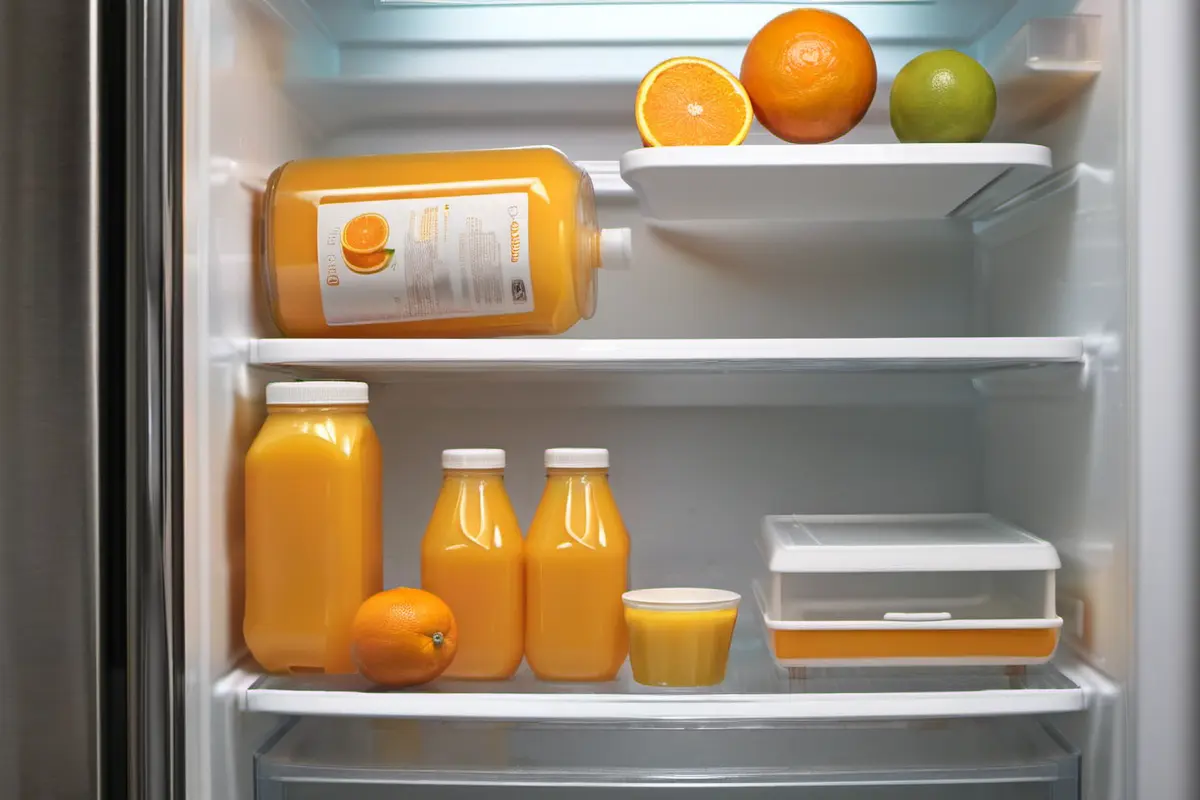Indicators of Spoilage
Signs That Orange Juice Has Gone Bad
Knowing how to spot when orange juice has gone bad is crucial to avoid the unpleasant experience of tasting spoiled juice. Here are the main indicators that your orange juice is no longer good to drink.
Visual Changes
First, check the appearance. If your orange juice has gone bad, it might appear darker or have a dull color compared to its usual vibrant orange. Any visible mold or excessive separation of the liquid and pulp should also raise red flags.
Changes in Smell
One of the most telling signs is the smell. Fresh orange juice has a sweet, zesty aroma. If it starts smelling sour, fermented, or just off in any way, it’s a strong indication that it has spoiled. Understanding the FDA’s guidelines on juice safety can also provide additional insights into why proper handling and storage are critical for maintaining safety Trust your nose—if it smells bad, it’s best to throw it out.
Taste Changes
If you’ve missed the visual and olfactory cues and taken a sip, the taste will confirm the state of your juice. Spoiled orange juice can taste sour or bitter. This change in taste is a direct result of the natural sugars in the juice fermenting.
Texture and Sediment
Lastly, feel the texture. Fresh orange juice can have some pulp, which is normal. However, if you notice thick, chunky particles or sediment that wasn’t there before, it’s a sign that the juice is past its prime. These changes can happen even if the juice has been stored properly.
Recognizing these signs of spoilage can help you avoid consuming bad orange juice, ensuring your safety and enjoyment. Up next, we’ll delve into the best practices for storing orange juice to maximize its shelf life and keep it tasting fresh for as long as possible. Stay tuned for expert tips on proper orange juice storage!

Best Practices for Storage
How to Properly Store Orange Juice
Proper storage is key to extending the shelf life of your orange juice and maintaining its freshness and flavor. Here are some essential tips to ensure your orange juice stays delicious and safe to drink.
Storage Tips for Fresh Juice
Freshly squeezed orange juice should always be stored in the refrigerator. To maximize freshness, keep it in a sealed container and try to consume it within 2-3 days. Exposure to air can accelerate spoilage, so it’s crucial to keep it tightly closed.
Storage Tips for Commercial Juice
For commercially processed orange juice, the rules vary slightly depending on whether it’s from the refrigerated section or shelf-stable. Refrigerated juice should be kept cold at all times and used within 7 to 10 days after opening. Shelf-stable juice can be stored at room temperature until opened but should be refrigerated and consumed within the same time frame once you break the seal.
Do’s and Don’ts of Orange Juice Storage
- Do keep orange juice in the fridge at all times, except for shelf-stable products which should be refrigerated after opening.
- Don’t leave orange juice out at room temperature for more than two hours, as this can allow harmful bacteria to proliferate.
- Do use a clean glass or jug to store the juice, and avoid using containers that previously held other beverages or food items.
- Don’t drink directly from the juice container as this can introduce bacteria from your mouth to the juice.
By following these simple yet effective storage tips, you can help ensure that your orange juice remains safe to drink and as tasty as the day it was squeezed or opened. For more insights on keeping beverages at their best, explore our article on whether Tropicana orange juice is healthy, which includes additional storage tips and health information.
Additional Tips for Enjoying Orange Juice
Beyond understanding how do you know when orange juice goes bad, there are several additional tips to enhance your experience and ensure you’re making the most of this refreshing drink. Here are some practical suggestions to keep your orange juice tasting its best and adding more value to your daily diet.
Experiment with Blends
Don’t hesitate to mix your orange juice with other fruit juices or ingredients to create delicious, healthy blends. Combining orange juice with carrot juice, for instance, not only adds a different flavor but also increases the nutritional value with added vitamins and antioxidants. Mixing with a bit of ginger or mint can also give a refreshing twist to your regular glass of orange juice.
Use in Recipes
Orange juice isn’t just for drinking. It’s a versatile ingredient in the kitchen, perfect for sweet and savory dishes. Use it to marinate meats, add a citrusy punch to salads with an orange vinaigrette, or bake it into desserts like orange muffins and cakes. The acidic and sweet nature of orange juice makes it an excellent component in various culinary creations.
Make Frozen Treats
If you have orange juice that you need to use up quickly, consider making frozen treats. Pour the juice into ice cube trays or popsicle molds for a refreshing treat on a hot day. This is also a great way to ensure you have orange juice on hand for smoothies or as ice cubes in cocktails.
Health Benefits
Remember, orange juice is more than just a tasty beverage; it’s packed with health benefits. It’s a rich source of vitamin C, which is crucial for repairing tissues and boosting the immune system. Orange juice also contains potassium, which helps regulate blood pressure, and flavonoids that have anti-inflammatory properties.
By following these tips and tricks, you can broaden the ways in which you enjoy orange juice and make the most out of every carton you purchase. Whether it’s keeping your storage methods sharp or turning your juice into new treats and recipes, there’s always a way to enjoy the zest and zip of fresh orange juice.
Conclusion
In conclusion, understanding how do you know when orange juice goes bad is essential for enjoying this nutritious and delicious beverage safely. From recognizing the signs of spoilage such as changes in color, smell, and taste, to following best storage practices, you can ensure that your orange juice remains fresh and enjoyable.
By keeping your juice properly refrigerated, consuming it within recommended time frames, and paying attention to the early signs of spoilage, you protect not only the quality of the juice but also your health. Remember, when in doubt, it’s better to err on the side of caution and discard any juice that appears to have gone bad.
Orange juice is a wonderful addition to a healthy diet, packed with vitamins and flavor. With the insights and tips provided in this article, you can confidently manage your juice consumption and enjoy every sip without worry. Cheers to fresh, tasty, and safe orange juice in every glass!
Now that we’ve covered how to store orange juice properly, our next section will explore some frequently asked questions about orange juice spoilage to clear up any remaining queries you might have. Stay tuned for helpful insights in our FAQs!
FAQs (Frequently Asked Questions)
FAQs about Orange Juice Spoilage
This section addresses some common queries about orange juice and its spoilage, helping you better understand how to manage and consume your favorite citrus drink safely.
What is the typical shelf life of orange juice?
The shelf life of orange juice varies depending on the type. Freshly squeezed orange juice can last 2-3 days if refrigerated properly, while commercially processed juice can last up to two weeks refrigerated and unopened. Canned or concentrated juice, when unopened and stored in a cool, dry place, can last up to a year.
What can I do to tell when orange juice is become sour?
You can tell if orange juice has gone bad through a few signs: a sour or fermented smell, a change in color to a darker or duller shade, the presence of mold, or an off taste. If you notice any of these signs, it’s best to discard the juice.
Can you consume orange juice following when it expires?
Drinking orange juice after the expiration date can be risky. While it might not always make you sick, the quality and safety of the juice could be compromised. Always check for signs of spoilage before consuming past the use-by date.
What should I do if I accidentally drank spoiled orange juice?
If you accidentally consume spoiled orange juice, monitor for symptoms of food poisoning, such as stomach upset, nausea, vomiting, or diarrhea. If symptoms persist or worsen, consult a healthcare provider for advice.
By keeping these FAQs in mind, you can ensure that you enjoy your orange juice in the freshest and safest way possible. Always remember to store your juice correctly and check it for signs of spoilage before drinking. Your health and taste buds will thank you!



